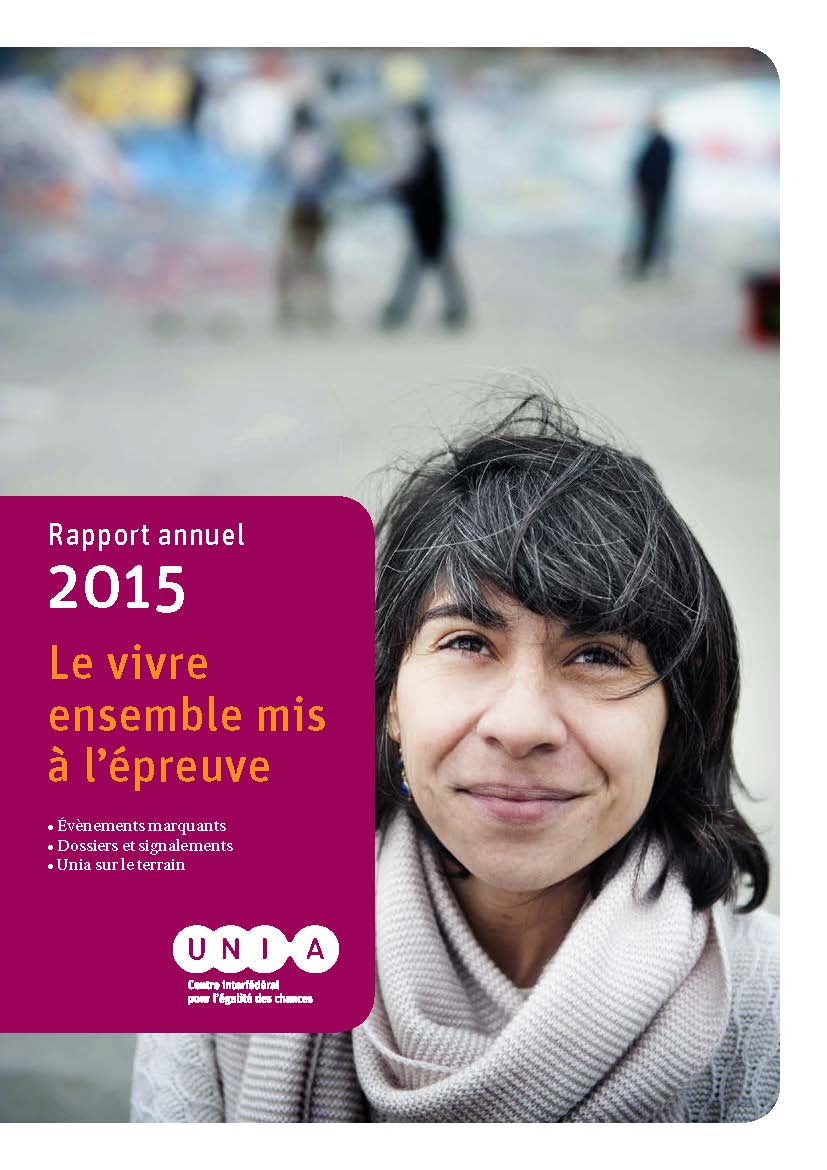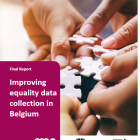Annual report 2015. Living together put to the test.
The year 2015 left a deep mark on our society. Violent conflicts and tensions on a global scale have had a direct impact on us. As we finalise this annual report, Belgium is suffering the repercussions of the bomb attacks at Zaventem airport and Maelbeek metro station in Brussels.

Living together put to the test
The divide between different sectors of the population seems to be getting wider, and social relations have been put to the test at various levels. We are confronted with fundamental questions regarding values and standards, freedoms and individual responsibilities, and ultimately, the actual possibility of harmonious cohabitation.
This annual report endeavours to provide an answer to questions such as these. It begins with an overview of the major events that had a repercussion on Unia's work in 2015. In particular, there is the tense climate that has reigned since the Paris attacks in January and November; the implementation of the "M-decreet" in Flemish education; the second Socioeconomic Monitoring report, which shows the close link between the origin of workers and their position on the job market; the assessment of anti-discrimination legislation; the (missing) legal framework regarding neutrality issues; recording hate crime and information exchanges on this subject.
Chapter 2 succinctly presents the main figures relating to the files and reports dealt with by Unia in 2015. In Chapter 3, these files are analysed according to the areas for action (goods and services, media/internet, employment, education, etc.) and in Chapter 4, according to the discrimination criteria (so-called "racial" criteria, disability, religious or philosophical beliefs, sexual orientation, age, wealth, etc.).
Chapter 5 shows how Unia has been active at a federal level, in relation to federated entities and on a local scale, since interfederalisation. As usual, this annual report concludes with a look to the future (chapter 6).
Presentation annuel report in the parliaments
In 2016 and 2017, we presented our annual report 2015 to the different Belgian parliaments. On October 19, 2016, we talked about the annual report in the Chamber of Representatives (Belgian Federal Parliament).
On November 28 (2016) we presented the annual report in the Parliament of the German-speaking Community (see also the video), on January 17 (2017) in the Walloon Parliament and on January 26 (2016) in the Flemish Parliament.
Downloads
Comparable publications
Annual report 2020: vulnerable human rights in times of crisis

In this extraordinary year, Unia continued to fight for human rights and equality. The corona pandemic acted like a magnifying glass. Those already in a vulnerable position were often the first or hardest hit by Covid-19 or its measures.
Evaluation of federal anti-discrimination legislation (2017)
Article 52 of the Anti-Discrimination Law states that the application and effectiveness of the anti-discrimination laws must be assessed by the Legislative Chambers. Unia has prepared an assessment report on the Anti-Discrimination Law and the Anti-Racism Law based on its own practical experience, national jurisprudence and its general expertise in the fight against discrimination.
Diversity Barometer Education (2018)
Unia commissioned a study to be carried out about equal opportunities in the schools in the three Communities in Belgium. The Diversity Barometer Education is the final part of a triptych. The first two parts were about Employment (2012) and Housing (2014).
Data on (in)equality & discrimination in Belgium: results of the project ‘Improving equality data collection in Belgium’ (2021)

"Improving equality data collection in Belgium” (IEDCB) is a Belgian project co-funded by the Rights, Equality and Citizenship (REC) programme of the Directorate-General for Justice of the European Commission. It was realised thanks to a partnership between Unia and the Equal Opportunities Team of the Federal Public Service for Justice. The project aims to improve the collection and processing of equality data in Belgium.
